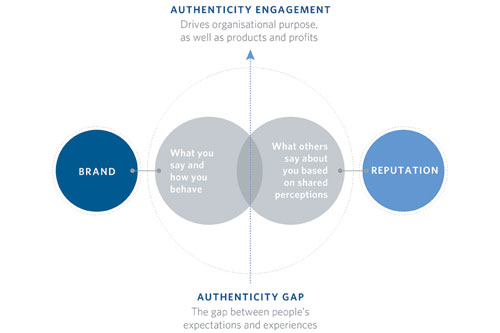
As communications consultants we spend much of our lives helping clients to understand what authentic engagement means for them and their customers. The most successful companies are those who can align their brand (what they say and how they behave) with their reputation (what others say about them).
In this new era of stakeholder empowerment, with organisations and management under increasing scrutiny, understanding your customers’ expectations is fundamental. This holds especially true for healthcare, where patients are becoming more informed and involved in decisions about their medical treatment and much of the pharma industry rightly focuses on patient-centred strategies.
About the Authenticity Gap
The Authenticity Gap is a methodology to help companies understand and manage the gap between audiences’ expectations and actual experiences with a company or brand. The insights allow organisations to develop strategies that enable authentic engagement with their audiences.
The Authenticity Gap studies use a framework of nine drivers to measure perceptions and beliefs about an organisation. The nine drivers fall into three interconnected groups: management behaviours, customer benefits and society outcomes, with each group made up of three individual drivers.
Instead of a list of rankings like so many other research studies, FleishmanHillard’s study gives communications and marketing executives actionable data they can use to shape their brands and business initiatives in order to address gaps between customer expectation and experience.
This year’s research looks at over 500 companies in the UK, Germany, the US, Canada and Japan. The UK data spanned eight industries and 20 categories, and reveal that many companies fail to meet the expectations of even their most knowledgeable and engaged consumers, and thereby continue to have an Authenticity Gap in their business.
Authentic engagement
Within the UK healthcare industry, the research covers four categories, namely biotech, medical devices and diagnostics, Rx pharmaceuticals and OTC pharmaceuticals. In each of these categories the research looked at eight companies, comparing the category expectation to the category experience.
The research highlights insights for companies seeking to build authentic relationships with their stakeholders and manage their reputation more effectively. There are five general principles to consider:
Belief follows behaviour
Invest in the things you want to be known for. Make sure these attributes matter to your important audiences, and communicate them. Behave as the company, or person, you want your audiences to think you are.
Work holistically
In managing brand and reputation, create a culture and an organisational structure that view the two as inextricably linked. No organisation can afford to have brand and reputation remain in silos. All viewpoints – not just consumers’ – must be at least considered and understood through both brand and reputation lenses.
Think in terms of values, value and valuation
Have good values, and live up to them in decisions, actions and relationships. Find out whether your organisation’s decisions and priorities actually reflect the values. Find out whether the company’s values are the same as those of the people it deals with. Define the value that is created in each relationship. Make sure it is enough to support the valuation you want – whether that is how much you charge for your product, how much you pay your staff, the price of your stock or some other measure of ‘value.’
Make it everyone’s job
Make brand and reputation management a part of every discipline – everyone’s responsibility – not just a function of communications or marketing.
Align measurement against specific business outcomes for both brand and reputation
Everything needs a clear connection to how it helps a business goal.
In short, try to be as you want to be seen and don’t disappear down departmental silos in your actions and reporting. Beyond that, make the link between your values, what value you bring and money. And finally, spread the work and responsibility and measure it to make sure it happens.
Charlotte Shyllon is director and partner, interim co-head of healthcare, David Berkovitch is director and partner, interim co-head of healthcare and Nick Andrews is senior vice-president and senior partner at FleishmanHillard London





